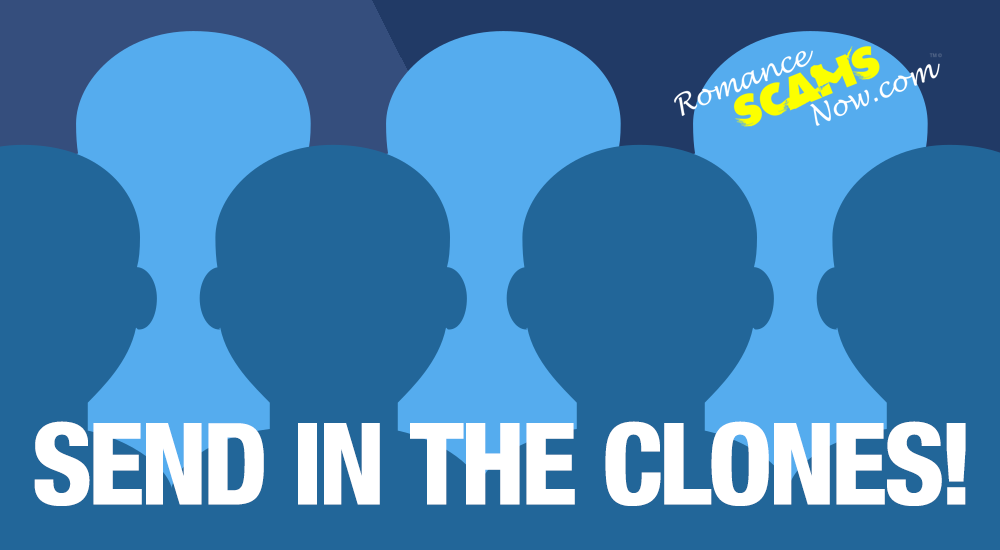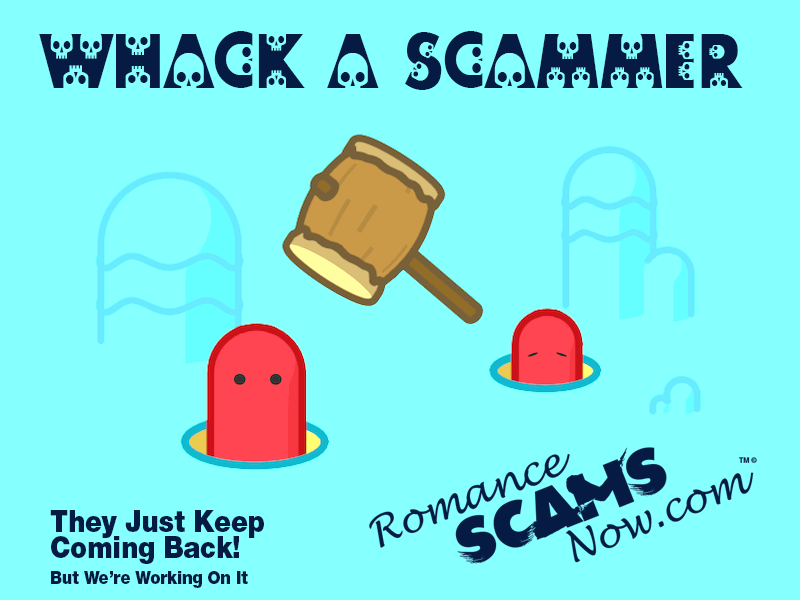SCARS™ Guide: Clones – Copying Profiles & Identities
Cloning: Can My Real Grandmother Please Stand Up?
Let The Scamming Begin!
[lwptoc]
Portions from Anonymous
Most Of Us Have Heard Someone Say This:
“Someone Cloned My Profile”
And they alert you that their profile must have been cloned!
(The other over used favorite term is “someone hacked by profile”)
The Urban Legend is that almost every account is being cloned. Your picture and your name have been used to create a new Facebook account and they don’t need your password to do this this (which is true) – they just copy everything – because you let them.
They want your friends to add them to their Facebook account, then your friends will think that it’s you and accept your request.
From that point on they can write what they want under your name and the scamming begins
Someone Is Always Sending Out Messages Alerting The World About This!
Sometimes it is a real problem, sometimes it is just someone freaking out
Is this accurate? No, not really, but scammers do clone profiles – that part is a fact.
We all know that scammers need an endless stream of fake profiles – different names, different faces, different content. But what few realize is how incredibly hard it is to do this. With over one billion fake identities online, this is a task bigger than inventing the atomic bomb!
Scammers are, after all, not lazy but they are practical and limited in the time they can spend on each fake identity. They have to budget their time for maximum effectiveness. This means that by definition they have to be fast when creating new profiles.
So They Clone
They do it because it gives them a real, rich identity they can control, but more importantly, it gives them the ability to “mine” a new ecosystem of victims – YOUR FRIENDS and FAMILY!
With each new victim, they look for how rich your profile is – how many people you are connected to. Quite frankly if you accept them and you have a very large friend-base that they can see (meaning you have not limited visibility to your Friend’s List) – they see you as a “fat target.”
The Scammer Model Goes Something Like This:
- They create 1 Professional “Gang” Profile – this identifies them to their Gang – this is what Yahoo & Sakawa Boys have – Professional Cartel Scammers DO NOT have these – they live off of the grid.
- Up to a dozen (or so) Cloned identities – they are meticulous copies of real people – they may be people they just like (meaning they like the look and richness of their profiles or identities) OR they are past victims that they know well (this is why blocking is important at the first hint of a scam, since scammers will not clone a working victim since it creates a chance of blowing up if discovered).
- 1,000 or more “Weak” poorly or rapidly created light fake profiles – these are the ones that have “binge” posting, very inconsistent, may be repurposed with different names at different times, and may be sloppy since they don’t have the time to invest in them.
Scammers Work Incredibly Hard To Steal Money
Some work 20 hour days (those few on their own), but most work in teams but still work 12 hour days since the odds are actually against them and it takes weeks or months to “close” a victim and get the money. The money does come but they don’t have a lot of focused attention to put on these fake profiles. Plus there is just the human limitation of attention – it is impossible to keep all the identities straight.
You should especially avoid Anti-scam groups with strong ties to Vietnam, Laos, and India that may be very careless about allowing scammers in as their members – these scammer group members could be the “harvesters”.
Do You See How Most Of These Things Lead Back To Your Own Decisions?
This is not about blaming yourself but helping you understand that there are precautions that you are responsible for and consequences to the failure to protect yourself and your connection.
Consequences From:
- Limiting the privacy settings on your profile
- Limiting your timeline to “friends only” (instead of “friends of friends”
- Limiting your friend’s list to ONLY YOU!
However, even with that, once they are YOUR FRIEND they can still see comments and likes in your social media timeline – once you let them in they will have access but you can at least limit it by proper privacy settings.
Even better is not to let them in at all, but your friends may be sloppy too – so you are potentially at risk always unless you learn how to spot the fakes that will inevitably come along.
But there is a sort of good news in all of this: cloning is hard. Everything must be copied by hand and it can take quite a bit of time to clone a profile. This limits how many cloned profiles an individual scammer can make.
Except … In Comes Outsourcing!
Scammers have plenty of money, so they hire outsourcing companies in Southeast Asia and India (Pakistan or Bangladesh) to just clone for them. Vietnamese outsourcing companies have been tied to this as have companies in Indian, Pakistan, Bangladesh, and even China. One group of 25 people was shut down in China in 2018 based upon information provided to their Ministry of State Security, but other outsourcing continues.
As scamming continues it will become increasingly production-line oriented.
The Cloning Begins
Sometimes the scammer will clone YOU or they look through your friend’s list and chooses one of them.
They take note of all of a person’s friends and make a decision to clone them. They save some of that person’s photos and create a whole new account. They copy all the information from the real account, use the same profile picture, and so on.
This is essentially “Cloning” the account (creating a “Doppelganger”), much like you might do if you lost access to your account and created a new account yourself.
If you suspect that a friend request comes from a CLONED account it is fairly simple to confirm this!
Either just text them (to their phone) and ask them, or ask the “clone” a trick question – such as “thanks for meeting me last Thursday at Dunkin Donuts” and look for the reply. Scammers trip themselves up all the time.
Why Clone
As we have said, cloning serves an important role in their scam production. It’s simple, they do it because they get away with it.
A clone makes them seem more credible. They can get you and others to accept their fake friend request by making them look more like the real thing.
Again, the good news is that most scammer fake profiles are very short-lived, so they do everything they can to make the account more believable. The more real it looks the longer it lasts, the more trust they will gain and have to spend less time creating more accounts.
The First Rule
Never Automatically Assume It’S Fake And Never Assume It Is Real
The first thing you should always do is ask the established friend if they created a new account. This usually results in them saying no, in which case you can tell them about the fake. If it is a fake you can report it to the social media company as a fake or especially an impersonation of someone you know! This is effective and can quickly get the clone deleted if reported properly.
Do NOT ask the fake in messenger a question only the real one would know. It can identify them, but it also gives them a question that they will go find the answer to. Ask them something random that there is no correct answer for – that way they are NOT alerted when you block them.
NEVER confront a scammer », always leave them guessing at what went wrong!
Lastly, you’ll want to report them to Facebook (or other social media companies) and have the real friend report them as well. The more a fake account is reported, the faster it’s taken down.
PLEASE SHARE OUR ARTICLES WITH YOUR CONTACTS
HELP OTHERS STAY SAFE ONLINE
SCARS™ Team
A SCARS Division
Miami Florida U.S.A.
TAGS: SCARS, Important Article, Information About Scams, Anti-Scam, Bangladesh, Cartel, Clone, Clones, Cloning, Facebook, Fake Profile, Gang, India, Pakistan, Scammer, Vietnam
CHAT WITH SCARS™ – CLICK HERE [icon name=”comment” class=”” unprefixed_class=”2x”]
END
MORE INFORMATION
– – –
Tell us about your experiences with Romance Scammers in our Scams Discussion Forum on Facebook »
– – –
FAQ: How Do You Properly Report Scammers?
It is essential that law enforcement knows about scams & scammers, even though there is nothing (in most cases) that they can do.
Always report scams involving money lost or where you received money to:
- Local Police – ask them to take an “informational” police report – say you need it for your insurance
- Your National Police or FBI (www.IC3.gov »)
- The SCARS|CDN™ Cybercriminal Data Network – Worldwide Reporting Network HERE » or on www.Anyscam.com »
This helps your government understand the problem, and allows law enforcement to add scammers on watch lists worldwide.
– – –
Visit our NEW Main SCARS Facebook page for much more information about scams and online crime: www.facebook.com/SCARS.News.And.Information »
To learn more about SCARS visit www.AgainstScams.org
Please be sure to report all scammers HERE » or on www.Anyscam.com »
Legal Notices:
All original content is Copyright © 1991 – 2020 SCARS All Rights Reserved Worldwide & Webwide. Third-party copyrights acknowledge.
SCARS, RSN, Romance Scams Now, SCARS|WORLDWIDE, SCARS|GLOBAL, SCARS, Society of Citizens Against Relationship Scams, Society of Citizens Against Romance Scams, SCARS|ANYSCAM, Project Anyscam, Anyscam, SCARS|GOFCH, GOFCH, SCARS|CHINA, SCARS|CDN, SCARS|UK, SCARS Cybercriminal Data Network, Cobalt Alert, Scam Victims Support Group, are all trademarks of Society of Citizens Against Relationship Scams Incorporated.
Contact the law firm for the Society of Citizens Against Relationship Scams Incorporated by email at legal@AgainstScams.org








Please Leave A Comment - Tell Us What You Think About This!